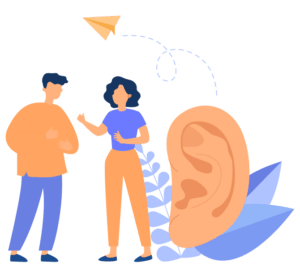A good hearing aid fitting means to make sure that the hearing aid fits your ear with comfort and provides the clearest sound. This is very easy to say, but extremely difficult to achieve.
The first part to a good hearing aid fitting is the physical fit of the hearing aid; we want it to fit comfortably and snugly. Too loose of a fit will cause feedback (whistling), while too tight could cause pain in the ear. Making sure the hearing aid you wear functions comfortably for you is extremely important.
Next, it is to make adjustments to ensure that the sound quality matches your level of hearing loss. To do that we refer to your audiogram and set a target of hearing for you. The target should allow you to hear a wide range of sound in different everyday living environments clearly, including group conversation and restaurants.
Lastly, we can’t rush. Our experience tells us that it requires, on an average, three follow up adjustments to the hearing aid to achieve our target of hearing. With your patience, we will bring your hearing level to the best you can hear with your hearing aid.

